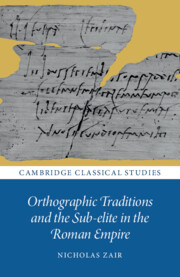In the late third or early second century BC the off-glide of the diphthong /ai/ was lowered to /ae̯/, leading to a change in spelling from <ai> to <ae> (see p. 40).Footnote 1 The use of <ai> for <ae> in inscriptions of the first–fourth centuries AD, especially in genitive and dative singulars of the first declension, is actually not particularly difficult to find, even in quite large numbers (although given the thousands of examples of <ae>, the frequency is probably still very low).Footnote 2 Some, but not all, of these will be due to Greek influence,Footnote 3 misreadings, or mistakes by the stonemason. Use of <ai> seems to have been one of the spellings favoured by Claudius (Reference BiddauBiddau 2008: 130–1), but examples can still be found long afterwards.
It is clear that Quintilian considers the <ai> spelling already highly old-fashioned:
ae syllabam, cuius secundam nunc e litteram ponimus, uarie per a et i efferebant, quidam semper ut Graeci, quidam singulariter tantum, cum in datiuum uel genetiuum casum incidissent, unde “pictai uestis” et “aquai” Vergilius amantissimus uetustatis carminibus inseruit. in isdem plurali numero e utebantur: “hi Sullae, Galbae”.
The syllable ae, whose second letter we now write with the letter e, they used to express differently with a and i, some in all contexts, like the Greeks, others only in the singular, when in the dative or genitive case, whence Virgil, who adored archaism, inserted ‘pictai uestis’ and ‘aquai’ in his poems. In the same words they used e in the plural: ‘hi Sullae, Galbae’.
The <ai> spelling is attributed to the antiqui by Velius Longus (5.4 = GL 7.57.20–58.3), Terentius Scaurus (5.2.2 = GL 7.16.7–10) and Festus (Paul. Fest. 24.1–2) but Marius Victorinus suggests that it may have been in vogue in the fourth century, which is not impossible given its presence in inscriptions, as already mentioned (although Marius recommends his charges always to use <ae>):
ae syllabam quidam more Graecorum per ai scribunt, ne illud quidem custodientes omnes fere qui de orthographia aliquid scriptum reliquerunt praecipiunt, nomina femina casu nominatiuo a finita plurali in ae exire, ut ‘Aeliae’, eadem per a et i scripta numerum singularem ostendere, ut ‘huius Aeliai’, inducti a poetis, qui “pictai uestis” scripserunt, et quod Graeci per i potissimum hanc syllabam scribunt …
Certain people write the syllable ae as ai, in the Greek manner, paying no attention to the teaching of practically everyone whose writing on orthography is preserved, which is that feminine nouns whose nominative is in -a should have plurals ending in -ae, as in Aeliae, but the singular cases in -ai, as in huius Aeliai, following the example of the poets, who wrote ‘pictai uestis’, and because the Greeks wrote this syllable with i …
Use of <ai> for <ae> is extremely rare in the corpora. There are only 2 instances in the curse tablets from the first to fourth centuries AD.Footnote 4 The use of Maicius beside Maecius (Kropp 1.7.1/1, mid-first century AD, Altinum) could perhaps be attributed to Greek influence, since many of the names listed on the tablet are Greek. In 1.5.2/1 (around AD 50, Capua) quaistum is the only instance of /ai/ in this tablet, which otherwise shows a number of substandard spellings: ilius for illius, uita for uītam, ipsuq for ipsumque, mado for mandō, Sextiu for Sextius. Greek influence is of course possible, but there is no other internal or external evidence for it.
In the Vindonissa tablets, we have the dative Secundi{i}na<e> (T. Vindon. 41), where only one stroke of the final letter II <e> is observed. Given how rare the use of <ai> is in the corpora it seems unlikely that that it is intended here (although the editor notes the fashionability of <ai> under Claudius). The possibility that the second stroke of the <e> was simply not preserved on the wooden backing of the tablet must be strong.
There is also a single example of <ai> in the dative in the Isola Sacra inscriptions, in Marcianai (IS 308, undated). The editors suggest that this is a morphological borrowing from Greek, perhaps to distinguish the dative from the genitive. The (surviving) inscription reads d(is) m(anibus) Marcianai Donatus, so there is no evidence that the composer was a Greek-speaker (nor was the inscription found in situ, so there are no other known inscriptions from the same tomb). It is the case that many of the people commemorated in these inscriptions have Greek names, which sometimes have Greek morphology. There are also three instances of a Latin name with a Greek first declension nominative (Saluiane 89, Manteiane 196, Galitte 288; see Reference AdamsAdams 2003: 490), and there is at least one instance of the hybrid Greek/Latin first declension genitive -aes attached to a Roman name, in Aureliaes (74).Footnote 5 Greek influence, while by no means certain, seems at least as likely as an old-fashioned spelling.



